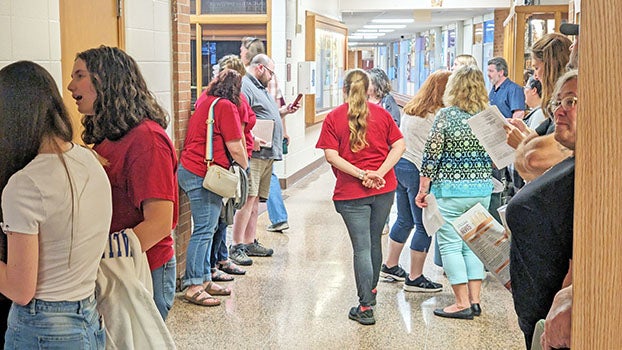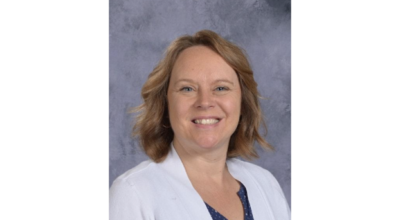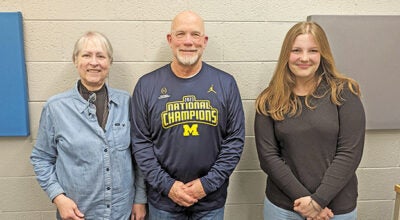‘Porn Pandemic’ film showing at Brandywine school board meeting prompts walkout
Published 11:14 am Tuesday, May 23, 2023

- Dozens of Brandywine Board of Education meeting attendees wait in the hallway following a walkout prompted by the showing of the short film “The Porn Pandemic” during Monday’s meeting. (Maxwell Harden | Leader Publications)
|
Getting your Trinity Audio player ready...
|
NILES CHARTER TOWNSHIP — Books and pornography were the trending topics at the Brandywine Community Schools Board of Education meeting Monday night.
After a lengthy discussion following the short film “The Porn Pandemic,” the board moved to table discussion regarding the “suspension of accessibility to selected books” in the middle/high school library.
The showing of the Family Watch International-produced film – which depicts “the addictive nature of porn, its impact on the brain, and how pornography viewing can lead to family breakdown, prostitution, sex trafficking and other crimes against women and children” – prompted a walkout from the majority of those in attendance in protest.
“You all seem to misunderstand how these meetings are supposed to work and what is appropriate,” said communications professor and Brandywine alumna Jasmine Labine during public comment. “This is an open meeting amongst you all. Your job is not to pontificate to an audience of community members, which is clearly what you were trying to do. You were trying to argue your agenda using a piece of what is honestly propaganda by a source that is questionable. That is wholly inappropriate.”
According to Board President Thomas Payne, the film served as evidence as to why books the board majority deems to be “pornographic” in nature should be removed from the school library. In February, the board voted 4-2 to suspend all “sexually explicit and violent books and material” from being added to the middle/high school library.
“I’m really kind of confused as to how we don’t see this as pornographic situations in these books,” Payne said. “The parents do have permission to allow their kids to look at pornography if they want. But, it shouldn’t be taxpayer-funded, and nor should it be accessible in the Brandywine community schools. I mean, if we view it as pornography … why would we make it accessible within our middle school, [our] high school?”
According to the district’s Sexually Explicit Books and Materials Board, the process of reviewing books began in October. The process has removed 38 books off shelves, none of which are classics like Shakespeare or Mark Twain – and has placed them behind the library counter.
The list of restricted books is as follows: “Perfect,” by Ellen Hopkins (3 copies);“Burned,” by Ellen Hopkins (3); “Extremely Loud & Incredibly Close,” by Jonathan Safran Foer (3); “Tricks,” by Ellen Hopkins (3); “Impulse,” by Ellen Hopkins (2); “Smoke,” by Ellen Hopkins (2); “Tilt,” by Ellen Hopkins (2); “Milk and Honey,” by Rupi Kaur (2); “The Sun and Her Flowers,” by Rupi Kaur (2); “The Lovely Bones,” by Alice Sebold (2); “Fallout,” by Ellen Hopkins (2); “The Perks of Being A Wallflower” by Stephen Chbosky; “Layla,” by Colleen Hoover; “Looking for Alaska,” by John Green; “Heart Bones,” by Colleen Hoover; “Ugly Love,” by Colleen Hoover; “Regretting You,” by Colleen Hoover; “Reminders of Him,” by Colleen Hoover; “Crank,” by Ellen Hopkins; “Traffick,” by Ellen Hopkins; “Glass,” by Ellen Hopkins; “Identical,” by Ellen Hopkins; “Push,” by Sapphire
“I have read multiple books on this list,” said Trustee Jessica Crouch. “And none of them have caused me arousal, which is what your definition was.”
During the school board’s April 25 meeting, Information Systems Director Doug Fox insisted that there are no pornographic materials in the district’s inventory and expressed the importance of providing diverse literature for students.
“Our goal is to provide books for a wide variety of students,” Fox said. “We have lots of age levels and lots of individual experiences, so we feel like these works do have value… Books also promote critical thinking. In order to be challenged in your thoughts, you have to be presented with different ideas and in order to learn, you have to have the opportunity to have something that doesn’t meet your current ideals.”
Currently, the junior/senior high school follows a directive issued by Walker to not allow students to check out restricted books unless given permission from a parent or guardian.
“They have been instructed to not check a restricted book out to a student without the parent granting access to that book first,” Walker said.
While no policy is currently in place, Walker said the policy recommended to the board last month by the books board aimed to ensure students are checking out books appropriate for their age levels. Books categorized as appropriate for ages 16 and up would be tagged as “restricted”, with students in grades 7-10 prohibited from checking out such books unless receiving written permission from a parent. Juniors and seniors would have access to restricted books but parents are able to fill out a form if they do not want their child to read the content.
“If we are already implementing this procedure, is it sufficient to get it written up and presented to the board as a policy and vote on it instead of reinventing the wheel,” asked Secretary Angela Seastrom.
Payne said that the board was working with the Sexually Explicit Books and Materials Board to finalize a policy that would be presented to the board for approval at a future meeting.






